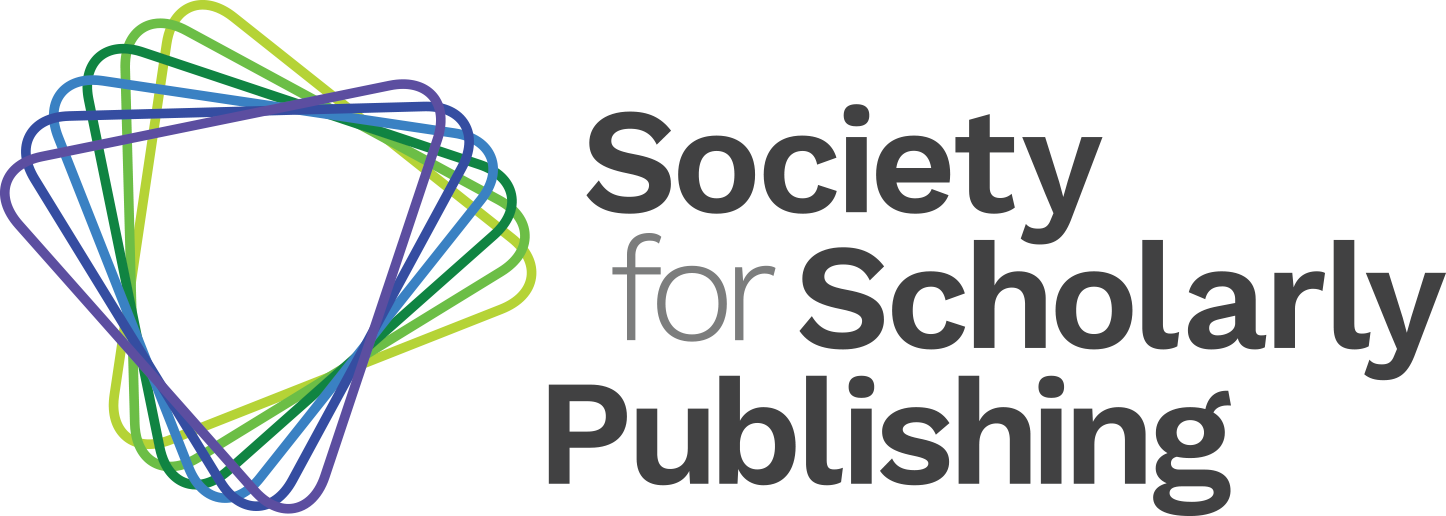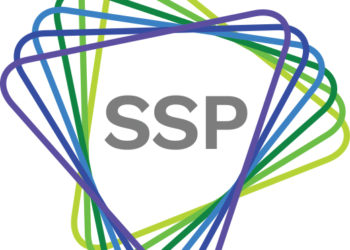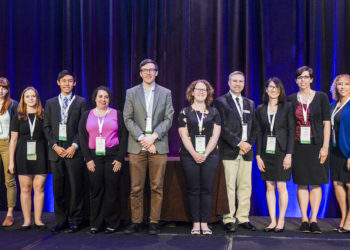Today’s perspective on the SSP Annual Meeting was assembled by Hillary Corbett, the Director of Scholarly Communication & Digital Publishing at Northeastern University and a newly elected SSP board member. It’s exciting to me to see that Hillary pursued the views of first time SSP Annual Meeting attendees. Even more exciting was that they engaged, felt welcome, and were willing to post their views here on the Kitchen!
So today Hillary Corbett asked the librarians: What Did You Learn At This Year’s SSP Annual Meeting?

Hillary Corbett, Northeastern University: This was my fourth time attending SSP’s Annual Meeting, and as usual, it did not disappoint. In recent years I’ve mostly stopped attending conferences oriented only to librarians, opting instead to go to events where I can spend most of my time interacting with and learning from publishers, vendors, and others. That being said, I was really pleased that Paula Stephan’s opening keynote address gave many in the audience their first introduction (from what I saw on Twitter) to the struggles that early career researchers face in terms of competing for postdoc positions and major research funding. This is something I think librarians have been much more aware of than publishers. These researchers exist in a symbiotic relationship with publishers — each needing the other to thrive, so it is essential that they understand each other’s needs and challenges. Next year it would be great to invite some of those early career researchers to SSP to learn more about the scholarly publishing industry, especially since some may be interested in an “alt-ac” career in publishing. As one of the SSP Fellows said in their blog post on Friday, it’s a common career track for those with advanced degrees who don’t continue in academia.
As always at SSP, there were focal areas that are very relevant to librarians — this year, they seemed to all start with the letter P: piracy, predatory journals, privacy, preprints… I may be biased, being on the Annual Program Committee, but I know our session organizers work hard to include a range of perspectives on their panels, and this really pays off for attendees. I think academic librarians in a wide variety of roles would find attending the SSP Annual Meeting very valuable, and that in turn makes attendance more valuable for publishers — getting to know each other outside the vendor/customer relationship is essential to increasing awareness and understanding of issues that affect us all. So, I’d encourage even more librarians to attend next year!
Alexa Pearce, University of Michigan: Leading up to my first time attending SSP, I experienced a mix of feelings including flattery (having been invited to participate in a panel!), curiosity (what exactly do publishers talk about, among themselves?), excitement (uncharted territory) and wariness (as a librarian… you know how it goes). I am happy to report that the territory did not feel so uncharted after all, as I attended sessions related to metadata and discoverability, preprints and open access, new models for academic book publishing, impact and metrics, and other topics that we have all been grappling with for some time.
But by the end of the extremely informative opening keynotes by Paula Stephan and Jeffrey Mervis, my reactions to what I was learning and thinking about could be summed up in a single word: sobering. In addition to some of the economic aspects of scientific research that Stephan detailed for us (how to get out of “postdoc jail” through publication in a high impact journal; the circumstances of unsalaried faculty running labs a.k.a., the “funding or perish” model), I was especially struck by her analysis of impact and innovative research. According to data that Stephan presented, research that adheres to conventional methods but is published in high impact journals, will likely see high citation rates within the first three years of publication, then taper off. Conversely, research that is more novel or innovative may not make it into high impact journals and is unlikely to be cited frequently within the first three years, but will then begin to see significant increases in citation and impact. However, that initial three-year period may be critical for establishing an author’s reputation and getting new or additional funding. I was not surprised to see that all of the copies of Stephan’s 2012 book, How Economics Shapes Science, are currently checked out from my library. But I am looking forward to reading it the next time I need to be brought back down to earth.
As for Mervis’s keynote on Science and the Trump Administration, it offered timely pulse-taking in terms of where we are and where we may be going, in a manner that was direct (Trump has not appointed a scientific policy advisor and doesn’t seem to believe he needs one) but not alarmist (even taking into account proposed reductions, we will still have substantial funding for scientific research). But on the heels of Stephan’s talk, which described the division of labor and administrative duties in labs, Mervis’s mention that funding agency reimbursement for overhead costs may be capped at 10%, down from 30%, did raise some alarm bells, in spite of his measured tone. This is simply one among many new realities we could be facing, but I think it stuck with me because I am employed by a major research university and the thought of a 20% cut does strike some palpable fear.
Overall, I found SSP to be a very welcoming conference. I appreciated the lively and well amplified Twitter conversations and I had a great time presenting in my own panel as well. I learned from Twitter that my panel was competing with a beer tasting in the exhibits hall, so was especially impressed that people stayed for the whole thing. I hope it was not too sobering.
Mira Waller, North Carolina State University: Having worked for both libraries and presses, I’ve come to believe that it’s crucial for librarians, publishers, and vendors to have deep conversations with each other outside of their specific roles. Rather than facing each other across a negotiation table and staying safe within our respective echo chambers, having a dialogue divorced from prescribed roles enables a more meaningful conversation and the opportunity to actually hear and learn from each other.
I was excited to see that the SSP Annual Meeting is an ideal venue to have these types of discussions. Somewhat sheepishly, I have to admit that this is my first attendance of the Annual Meeting, despite having previously worked as Project Euclid’s Director of Publishing Services. It took my transition back into librarianship to make me realize the opportunities this meeting presented. Throughout the sessions I attended, I was struck by how many of them, from government funding in STEM, to data sharing, to measuring research impact, focused on best supporting the stages of the research lifecycle. This is a current area of emphasis for most academic libraries, with many realigning subject liaison roles to incorporate data management planning, altmetrics, researcher IDs, bibliometric analysis, and experimental publishing models.
Change is inevitable, and during the closing plenary it was evident that the Scholarly Kitchen Chefs have been thinking about the changes affecting all the players in the scholarly communication ecosystem. While I may not have found any solutions at this meeting, I did walk away feeling hopeful that we were asking many of the right questions, and including more than just the usual players.
(Added Charlotte June 12th 8pm EDT)
Charlotte Roh, University of San Francisco: This year was my second time attending the Society for Scholarly Publishing Conference, and there was a marked difference not just in the number of attendees, but the makeup of the participants. I was pleasantly surprised to see so many librarians, smaller journal publishers, and book publishers in attendance, and the conversations that I had during the breaks were more nuanced as a result. The keynote speakers did a great job of addressing today’s current politics, which we are all aware of but sometimes don’t have the time to sit and consider how they are impacting the academics with whom we work, and ultimately, the business of scholarly publishing. The highlight of the conference for me was undoubtedly the diversity panel with Beacon Press, Oxford University Press, and MIT Press. I had been curious about the progress of the Mellon University Press Diversity Fellowships, and was very happy to hear that some presses have moved even beyond mere representation to address issues such as white supremacy. The refrain that I kept hearing, was “It’s not too late,” because admittedly, we in academic publishing are very late in tackling these issues. I also learned that Elsevier is going through global diversity certification with EDGE and spoke with an editor of a medical journal who told me she had been pushing for more global representation in her editorial board — it was a relief to hear that journals are not falling completely behind in these efforts!
The conference was also illustrative to me of the divide that still exists between publishers and libraries. For example, one of the big new innovative ideas that seemed to be a theme of the conference was individualization. Tracking our users in order to provide a targeted experience seems like a good idea, and users are by now accustomed to this experience in their everyday social media consumption. The benefits outweigh the negatives. But I think publishers that are developing these products need to make their programmers and legal departments aware of the existence of the Family Educational Rights and Privacy Act (FERPA). Academic library records have long been maintained as private under FERPA, and patron privacy has not only been tested in libraries, it has been tested for technology companies as well. As the new technology adage goes: The more information you have on your users, the more information the government can ask from you.
Another change in attitude seemed to be regarding Sci-Hub and the user experience. I think publishers are finally realizing that it isn’t necessarily piracy that it is the greatest evil — after all, a large number of users of Sci-Hub seem to have perfectly legal access to very many articles and databases. According to the research of Gabriel Gardener, the difficulty (or perceived difficulty) of accessing articles has actually been a greater culprit. In the words of Chan Li from the California Digital Library, “In the long run, [DRM] will hurt publishers and their business. It will not protect publishers.” Fortunately, amongst the innovations that were showcased at SSP were several aggregators, scholarly Spotifys if you will, which might prove to offer solutions. The question arises then, however, why this sort of aggregation tool doesn’t already exist for libraries to provide to their patrons, whose access should already be paid?
_________
We’ve asked the Chefs, asked the Fellows, and now asked the Librarians. Once again. it’s your turn. What Did You Learn At This Year’s SSP Annual Meeting?
(You can answer even if you aren’t a librarian!)
Discussion
4 Thoughts on "Ask The Librarians: What Did You Learn At This Year’s SSP Annual Meeting?"
This was fascinating post, as most of them are. I’ll be trotting down to the lower level to pick up our library’s copy of How Economics Shapes Science. What is missing from this, and many other posts in SK is the voice of the funding agencies. Given the millions given for research by NIH, Gates and many other organizations shouldn’t we be asking, and listening, to what they want in terms of impact, relevance, results, distribution?
Thank you for this post. As a first-time OA librarian attendee, I found SSP informative and well-organized. My thanks to all involved with planning and producing the conference.
My takeaways mirror those of your interviewees. Issues around piracy, pre-print repositories, and OA monographs dominate my notes. I was also interested to hear issues and questions around the big data repositories and bibliometrics. I agree with Charlotte regarding the divide between publishers and librarians; this conference helped me explore the nuances of this divide. As someone who feels OA can solve most (if not all) issues, SSP showed me there is more work to be done, on the side of both publishers and librarians.
More librarians and OA warriors should attend SSP and I will encourage them to do so.
As I pointed out at the AAUP meeting in Austin earlier this week, where a plenary on diversity was also a centerpiece of the program, there is an interesting comparison to make between racial and gender diversity. Serious efforts to deal with gender diversity got under way when Women in Scholarly Publishing (WISP) was formed at the AAUP meeting in 1980. Now there is parity among men and women in the top ranks of AAUP publishing, with as many female press directors and AAUP presidents as male, whereas progress in racial AUP had a Diversity Committee in the 1990s and two of my staff at Penn State Press, Shauna Foster and Alison reeves, played major roles in the committee’s work. But here we are two decades later asking the same questions and confronting the same problems. The efforts of WISP were so successful that the organization was disbanded some years ago. The same cannot be said for racial diversity. Why the difference between the two in rates of progress?


